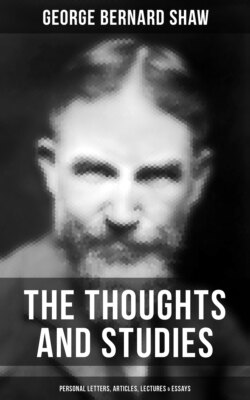Читать книгу The Thoughts and Studies of G. Bernard Shaw: Personal Letters, Articles, Lectures & Essays - George Bernard Shaw - Страница 16
PILLARS OF SOCIETY, 1877
ОглавлениеPillars of Society is the history of one Karsten Bernick, a “pillar of society” who, in pursuance of the duty of maintaining the respectability of his father’s firm of shipbuilders, has averted a disgraceful exposure by allowing another man to bear the discredit not only of a love affair in which he himself had been the sinner, but of a theft which was never committed at all, having been merely alleged as an excuse for the firm being out of funds at a critical period. Bernick is an abject slave to the idealizings of one Rorlund, a schoolmaster, about respectability, duty to society, good example, social influence, health of the community, and so on. When Bernick falls in love with a married actress, he feels that no man has a right to shock the feelings of Rorlund and the community for his own selfish gratification. However, a clandestine intrigue will shock nobody, since nobody need know of it. He accordingly adopts this method of satisfying himself and preserving the moral tone of the community at the same time. Unluckily, the intrigue is all but discovered; and Bernick has either to see the moral security of the community shaken to its foundations by the terrible scandal of his exposure, or else to deny what he did and put it on another man. As the other man happens to be going to America, where he can easily conceal his imputed shame, Bernick’s conscience tells him that it would be little short of a crime against society to neglect such an opportunity; and he accordingly lies his way back into the good opinion of Rorlund and Company at the emigrant’s expense.
There are three women in the play for whom the schoolmaster’s ideals have no attractions. First, there is the actress’s daughter, who wants to get to America because she hears that people there are not good; for she is heartily tired of good people, since it is part of their goodness to look down on her because of her mother’s disgrace. The schoolmaster, to whom she is engaged, condescends to her for the same reason. The second has already sacrificed her happiness and wasted her life in conforming to the Rôrlund ideal of womanliness; and she earnestly advises the younger woman not to commit that folly, but to break her engagement with the schoolmaster, and elope promptly with the man she loves. The third is a naturally free woman who has snapped her fingers at the current ideals all her life; and it is her presence that at last encourages the liar to break with the ideals by publicly telling the truth about himself.
The comic personage of the piece is a useless hypochondriac whose function in life, as described by himself, is “to hold up the banner of the ideal.” This he does by sneering at everything and everybody for not resembling the heroic incidents and characters he reads about in novels and tales of adventure. But his obvious peevishness and folly make him much less dangerous than the pious idealist, the earnest and respectable Rôrlund. The play concludes with Bernick’s admission that the spirits of Truth and Freedom are the true pillars of society, a phrase which sounds so like an idealistic commonplace that it is necessary to add that Truth in this passage does not mean the nursery convention of truth-telling satirized by Ibsen himself in a later play, as well as by Labiche and other comic dramatists. It means the unflinching recognition of facts, and the abandonment of the conspiracy to ignore such of them as do not bolster up the ideals. The idealist rule as to truth dictates the recognition only of those facts or idealistic masks of facts which have a respectable air, and the mentioning of these on all occasions and at all hazards. Ibsen urges the recognition of all facts; but as to mentioning them, he wrote a whole play, as we shall see presently, to shew that you must do that at your own peril, and that a truth-teller who cannot hold his tongue on occasion may do as much mischief as a whole universityful of trained liars. The word Freedom means freedom from the tyranny of the Rorlund ideals.
